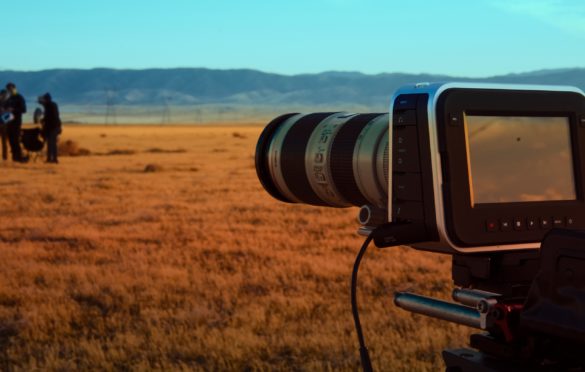

H ighly successful video companies start with a strong production company business plan. Whether your company has been around for a while, or you’re a freelancer ready to take your services to the next level, this post will provide you with actionable strategies for success to compete more effectively right now.
It all beings with formulating the business plan that will get you where you want to go. If you don’t have a business plan, don’t worry. We provide a free business plan template below and will walk you through it.

Download your FREE printable business plan template for your video production.
Just enter your email address and we'll instantly send it to you!
Essentially it's a tool for raising funds, creating a roadmap, or altering course and plotting out the next steps.
One purpose of any business plan to so convey to investors, or a bank, why they should put money into this business.

What does that mean?
It means you need this business plan for a production company to prove that you will make money. To prove it to you, but also to any investors.
After all, nobody invests to lose money. Or break even. So with that in mind, let's forge ahead into the actual writing of the business plan.
Every business plan starts from the top down, with an executive summary.
What is that, exactly?
An executive summary is a short part of a larger proposal or report that summarizes the main points so the reader can become quickly educated on the whole document without having to read it all.
So it’s a detailed overview.
Of course, "executive summary" has a nice ring to it.
Your job here is to lay out the big picture of your plan. Some questions to ask yourself: Why do you want this business in the first place?
Similarly, what inspired you to start it? What's going to make it work?
Next, start to answer the questions your investors might have. Try getting into their head-space.
"Why would YOU invest in this business?"
You might want to write about the competition. The targeted demographic. Be specific here.
What need does your business fill? Which kinds of customers and clients are you targeting?
Furthermore, what else sets you and your business apart?
Especially relevant is using concrete examples and not only ideas. Can you cite previous work you've done?
This brings us to.
Your production companies competition
What does the rest of the field looks like. Your investor will want to know if they don't already.
What sets this company and this production company business plan apart from others?
Knowing the entire field of competitors you have is a good idea, even if it's a very long list.
Your production company business plan must factor in what else is being offered. That way you can adjust, and target a more specific niche.
Or, you can figure out what you can do better.
For example: what can you identify in your competitor's list of services that you know you can nail?
This is what your video company plan needs to convey.
Finally, remember to think of it from the investor's standpoint. How is this an opportunity for them?
This step is easy to do, but hard to do well.
Can you take a good long look at your video production studio? With the intent to circle problems? Areas that need improvement?
The second part of this step might be easier. Find the areas where your video production studio can really shine.
In contrast, you don't want to elaborate on weaknesses in your video production company business plan. Rather, you want to identify them so you can find ways to address them.
You need to have answers to the questions these flaws might bring to the mind of your investors.

Then go beyond looking in the mirror.
Look back at the field before you.
This is a business plan for a production company. What opportunities exist for that?
Most of all, try and tailor this production house business plan to specific needs.
Here are a few methods of company self-analysis:
This is a way to identify changes in your industry, to target potential growth opportunities. The acronym stands for:
Political Factors
Economic Factors
Social Factors
Technological Factors
Look at each factor as it relates to your business plan and your field. Read more about PEST here.
We've mentioned elements of SWOT:
Strengths
Weaknesses
Opportunities
Threats
The one to focus in on here is threats. Don't assume everything will work out for the plan just the why you'd like it to.
Because it won't. Investors will know that. You should not only know it, you should expect it.
Most important of all: prove that you're prepared for whatever may happen.
Here's a cool way to approach your SWOT analysis. Try applying your strengths to your opportunities and see what kind of leverage you can create.
Then theoretically expose your weaknesses to your threats. Are you in trouble? Do you need to address something to better protect your company?
Think of this as planning for a battle. Therefore, you don't want to ignore cracks in the wall if your enemy is bringing a battering ram.
Strategy, structure, systems, style, shared values, staff, and skills. The 7S model was developed by business consultants Robert H. Waterman Jr. and Tom Peters. It's also known as the McKinsey 7S framework.
The idea here is that your business needs these elements to be aligned and "mutually reinforcing". Let's go over each "S".
Strategy: How does this business plan to gain an advantage.
Structure: How do you divide the various operations of the company.
Systems: Procedure for measurement, reward and resource allocation.
Skills: the companies core and distinctive capabilities.
Staff: Human resources.
Style: Behavior patterns of the key groups like managers.
Shared values are in the middle of them all on the diagram. It's somewhat self-explanatory.
In theory, using these methods of self-analysis will help you a great deal. Due to them you'll know, and decide, all sorts of things about your production company.
Start putting these ideas onto paper now! If you haven’t already…
A business plan for a production company must lay out how you will get started. This is also referred to as a "roll out plan".
How you engineer your beginning is critical to your cash flow. What do you need to get started?
And can you start at a sustainable level?
Will you open a physical office space right off the bat?
Overhead is a major cost. If this is more of a production house business plan then you’ll want to factor that in.
Do you have existing clients?
Equipment or gear already in place?
A video production business plan suggests that your focus will be on video production. Things like equipment will be critical.
In addition to considering this an entertainment production company business plan you may also want to focus on creative development.
How you want to focus effects how you want to phrase things. And it matters almost immediately.
It's a good idea to propose that you start small.
There are two reasons for this.
The first is that you will scare away investors if you ask for too much up front, almost without fail they can tell if you are asking for more than it seems like you need.
It also throws into question how serious you are about sustaining success.
Which leads to the second reason.
It'll be much harder for you to sustain success if you ask for big upfront funding that you aren't sure you can earn back plus profit.
Let's say because you know of a few jobs you'll have early on, that you ask for less up front.
You'll be able to get rolling right away, earning back the initial investments and then some.
Above all you want to start off with easy wins.
Or as close to easy wins as you can get when launching or re-launching a video production business plan.
Seems like it would somewhat obvious not to ask for more than you can earn back.
Rather, it's a mistake people make all the time.
Speaking of which.
Any business needs capital. As a result, you need a section where you lay out the cash flow for the production house business plan.
What kind of money do you expect to have coming in, and how much do you expect to be spending?
Make the budget, while also estimating how you'll be earning.
If you can't demonstrate this, then you need to go back to the drawing board.

You will want to get involved with an accountant at some point soon.
But remember, this is a business plan for a production company. So you may have a lot of costs coming at you early just to get started.
Try to learn how to be your own bookkeeper.
Your video production business plan is almost complete. Another section worth including would be one on marketing.
You want to prove that business will be coming in, and not assume it will on faith alone.
Building a strong portfolio is a must. Consider again what niche you may be able to serve best. Find a solid "bread and butter" to start with.
Remember, good businesses expand when they need to. They don't bite off more than they can chew right out of the gate.
Do some research on how you’ll be building the best website for your product.
Get your production company a few social media accounts, and start trying to create a presence there. You'll need to find many ways to attract clients, and show your work.
Do some additional research on how to market a production company.
All this needs to find its way into the marketing section of your production company business plan.
The day to day operations are a critical part of the plan. Have you visualized what the daily workflow will be?
Now is the time to do that. Who is going to be on your team, and how will it grow and change over time?
Determine what tasks will take priority each day, and how to best utilize your resources and finances.
This will be a key step in determining if your production company business plan is sustainable.
Ask yourself a few of the following questions:
How much time per day will you spend building your client base? What elements of each job will you tackle in-house? Which tasks might you outsource?
What equipment and gear do you own?
When will it need to be replaced and/or upgraded?
Are you going to hire anyone to start? Will they be full-time employees?
Will you hire independent contractors per project? How many, roughly?
As mentioned in the finance section, you need to know how you'll plan your reporting for taxes and your bookkeeping process.
These questions will help you start to determine what each "day at the office" will look like.
The clearer a picture you can paint here, the better.